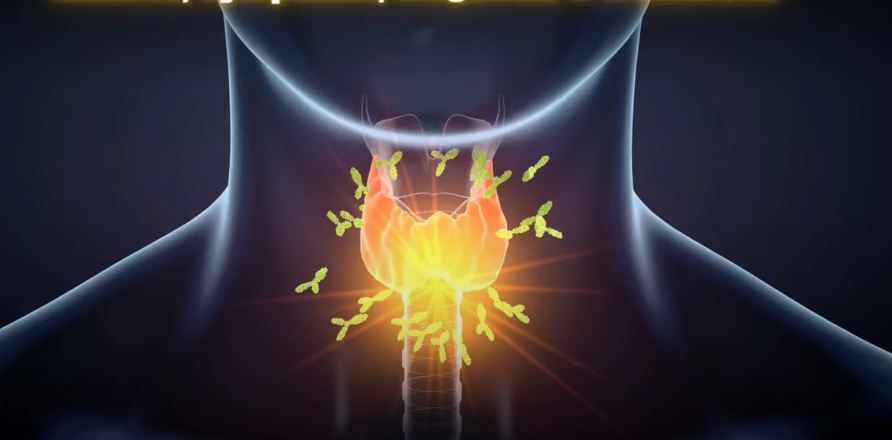
Imagine having a full night’s sleep but still feeling exhausted when you wake up. Your weight changes for no apparent reason. Your skin becomes parched, your hair becomes thinner, and your thoughts become cloudy. These symptoms could be Hashimoto’s disease, an autoimmune condition that silently targets the thyroid, rather than being simply indicators of stress or aging.
Despite the fact that Hashimoto’s affects millions of people worldwide, many people go years without receiving a diagnosis. The good news? People now have the means to take charge of their health thanks to improvements in treatment, increased awareness, and lifestyle modifications.
Hashimoto’s Disease: Key Facts and Insights
| Category | Details |
|---|---|
| Medical Name | Hashimoto’s Thyroiditis (Chronic Lymphocytic Thyroiditis) |
| Cause | Autoimmune attack on the thyroid gland |
| Symptoms | Fatigue, weight gain, dry skin, hair thinning, joint pain, depression |
| Most Common In | Women aged 30-50 |
| Diagnosis | Blood tests for TSH, T4, T3, and thyroid antibodies |
| Treatment | Levothyroxine, lifestyle adjustments, stress management |
| Prevalence | Affects 5 out of 100 people in the U.S. |
Hashimoto’s disease: what is it? Knowing About the Quiet Thyroid Attack
The immune system unintentionally targets the thyroid gland in Hashimoto’s disease, a chronic autoimmune disorder that gradually damages the thyroid and eventually results in hypothyroidism. The hormones that control mood, energy, and metabolism are produced by the thyroid, a butterfly-shaped gland in the neck.
This illness progresses slowly and frequently goes years without anyone noticing. Patients may have mild symptoms at first, but as thyroid function deteriorates, they may experience cognitive problems, weight gain, and fatigue. Untreated Hashimoto’s disease can result in serious side effects like heart disease, infertility, and even myxedema coma, a potentially fatal illness brought on by severe hypothyroidism.
Identifying the Signs: More Than Just Fatigue
It is challenging to diagnose Hashimoto‘s disease because of its wide range of complex symptoms. Before learning the true cause, many patients receive incorrect diagnoses of anxiety, depression, or chronic fatigue syndrome.
Common Symptoms Include:
✔ Extreme fatigue that doesn’t improve with rest
✔ Unexplained weight gain despite diet and exercise
✔ Cold intolerance—feeling cold even in warm environments
✔ Brain fog, memory issues, and difficulty concentrating
✔ Hair thinning and dry, brittle nails
✔ Joint pain, muscle stiffness, and body aches
✔ Depression, anxiety, or mood swings
✔ Puffy face and swelling in the neck (goiter)
Because these symptoms can mimic other conditions, Hashimoto’s is often overlooked by doctors, leading to years of unnecessary suffering.
How Is Hashimoto’s Diagnosed? The Tests That Matter
A proper diagnosis starts with comprehensive blood tests. Here’s what doctors look for:
✔ TSH (Thyroid-Stimulating Hormone): High levels indicate the thyroid isn’t producing enough hormones.
✔ T4 & T3 (Thyroid Hormones): Low levels confirm hypothyroidism.
✔ Thyroid Peroxidase (TPO) Antibodies: High levels indicate an autoimmune attack.
✔ Thyroglobulin Antibodies (TgAb): Another marker for Hashimoto’s.
If TSH levels are elevated and thyroid antibodies are present, a Hashimoto’s diagnosis is likely.
The Surprising Connection Between Hashimoto’s and Other Autoimmune Diseases
Autoimmune diseases tend to cluster together, meaning if you have one, you’re at a higher risk of developing others. Hashimoto’s is commonly linked to:
🔹 Rheumatoid arthritis
🔹 Type 1 diabetes
🔹 Celiac disease
🔹 Lupus
🔹 Multiple sclerosis
If you have Hashimoto’s, it’s important to monitor your overall immune health to catch any additional autoimmune conditions early.
What Causes Hashimoto’s? The Hidden Triggers
Scientists believe genetics and environmental factors both play a role in Hashimoto’s development.
Known Risk Factors Include:
🧬 Family History: Having a close relative with Hashimoto’s increases your risk.
🦠 Viral Infections: Epstein-Barr virus (EBV) and other infections may trigger autoimmune responses.
🌍 Environmental Toxins: Exposure to pesticides, radiation, and heavy metals can be damaging.
💊 Excess Iodine Intake: Too much iodine can overstimulate the thyroid, leading to inflammation.
😰 Chronic Stress: Prolonged stress weakens immune function, increasing autoimmune risk.
By identifying personal risk factors, individuals may be able to reduce the likelihood of developing Hashimoto’s.
Treatment: Can Hashimoto’s Be Cured?
While there is no cure, Hashimoto’s is manageable with medication and lifestyle adjustments.
✔ Levothyroxine (Synthroid, Levoxyl): A synthetic thyroid hormone that restores normal levels.
✔ Dietary Modifications: Anti-inflammatory foods may help reduce symptoms.
✔ Stress Reduction: Mindfulness, yoga, and sleep management can improve thyroid function.
✔ Supplements: Selenium, vitamin D, and magnesium support immune health.
With early treatment, many patients live normal, healthy lives without major complications.
Can Diet Help Manage Hashimoto’s?
Though diet can’t cure Hashimoto’s, certain foods support thyroid health while others may worsen symptoms.
🥦 Best Foods for Hashimoto’s:
✔ Selenium-rich foods (Brazil nuts, eggs, fish)
✔ Anti-inflammatory foods (leafy greens, turmeric, berries)
✔ Healthy fats (avocados, olive oil, nuts)
🍞 Foods to Avoid:
❌ Gluten (some patients report symptom improvement after removing it)
❌ Processed foods with artificial additives
❌ Excess iodine (seaweed, iodized salt)
Many patients report notable improvements after making dietary changes.
Conclusion: The Prospects for Treating Hashimoto’s
You don’t have to let Hashimoto‘s disease rule your life. Most people can manage their weight, regain their energy, and regain mental clarity with the correct diagnosis, medication, and lifestyle changes.
Getting a thyroid test is worthwhile if you’re dealing with chronic fatigue, weight gain, or mental fog. Early intervention is essential; your quality of life will improve the sooner you act.
Although Hashimoto’s disease may last a lifetime, you don’t have to let it define you. With the correct information, proactive medical care, and support, you can regain control and rediscover who you are.
